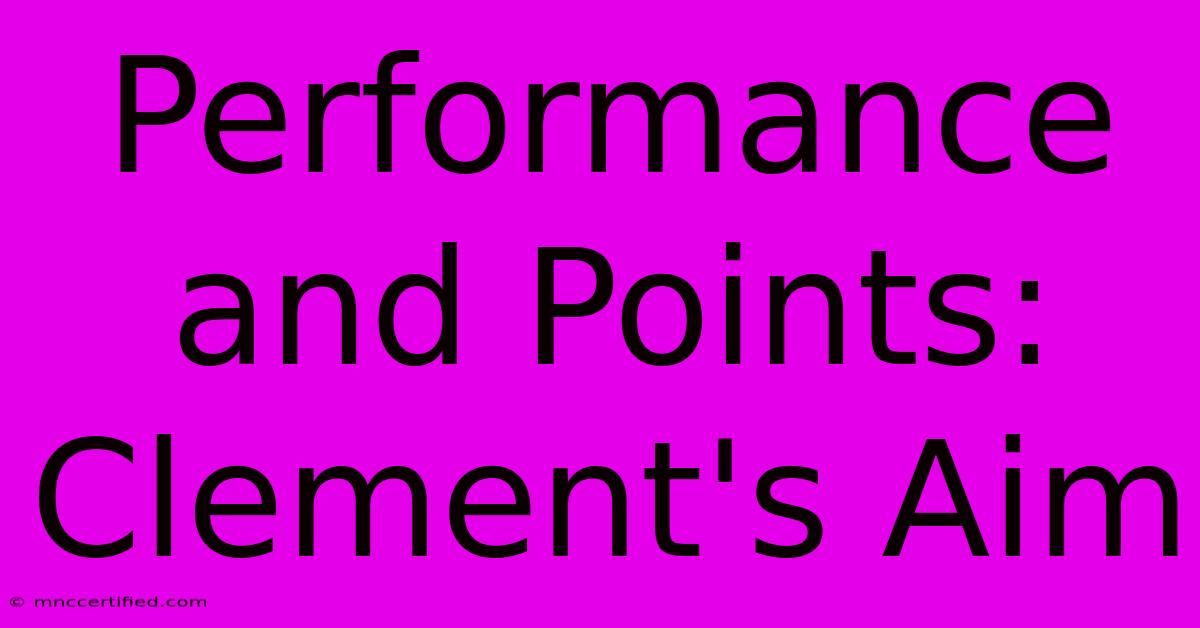Performance And Points: Clement's Aim

Table of Contents
Performance and Points: Clement's Aim – A Deep Dive into Achieving Peak Performance
This article delves into the multifaceted ambition of achieving peak performance, specifically focusing on the individual's drive – "Clement's Aim." We'll explore the strategies and mindset required to not only improve performance but also accumulate points, whether in a competitive game, professional career, or personal goal setting. We'll look at how Clement, and indeed anyone, can strategically bridge the gap between aspiration and achievement.
Understanding the Interplay of Performance and Points
The core of Clement's (and your) aim lies in understanding the intricate relationship between performance and points. Points, in this context, represent the tangible outcome – the score, the reward, the achievement. Performance, however, is the process, the effort, the execution that leads to those points. Simply put, strong performance consistently translates into higher points.
Defining Success: Beyond Mere Points
It's crucial to define success beyond just the accumulation of points. While points are a measurable indicator of progress, true success lies in the consistent improvement of performance. Focusing solely on points can lead to shortcuts, unsustainable practices, and ultimately, burnout. Clement's aim, therefore, needs to be holistic, encompassing both aspects.
Strategies for Boosting Performance and Point Accumulation
Several key strategies can help Clement, and anyone striving for similar goals, enhance their performance and consequently, their point tally:
1. Goal Setting and SMART Objectives
Specific, Measurable, Achievable, Relevant, and Time-bound (SMART) goals are fundamental. Instead of a vague aim like "improve performance," Clement should set concrete goals: "Increase average score by 15% within the next quarter," or "Consistently achieve a top-three ranking in monthly competitions." This allows for tracking progress and identifying areas for improvement.
2. Skill Development and Practice
Consistent and deliberate practice is paramount. Clement needs to identify his weaknesses and work diligently to strengthen them. This may involve seeking mentorship, enrolling in training programs, or simply dedicating more time to focused practice. Regular self-assessment is crucial for identifying areas needing attention.
3. Strategic Planning and Analysis
Analyzing past performance is key. Clement needs to identify patterns, understand his strengths and weaknesses, and adjust his strategies accordingly. Data analysis, feedback from others, and self-reflection all contribute to a comprehensive understanding of what works and what doesn't.
4. Maintaining Physical and Mental Well-being
Peak performance requires both physical and mental resilience. Adequate sleep, nutrition, and stress management techniques are essential. Clement needs to prioritize self-care to prevent burnout and maintain consistency in his efforts. This could include incorporating mindfulness techniques, regular exercise, and a healthy diet.
5. Adaptability and Learning from Setbacks
Setbacks are inevitable. Clement's ability to adapt to changing circumstances, learn from mistakes, and bounce back from failures will determine his long-term success. Viewing setbacks as learning opportunities fosters resilience and prevents discouragement.
Measuring Success and Continuous Improvement
Regularly tracking progress is vital. Clement should use metrics relevant to his specific context. This could involve monitoring his scores, analyzing his performance in specific areas, or gathering feedback from coaches or peers. This data-driven approach will help him refine his strategies and achieve continuous improvement.
Conclusion: The Long-Term Vision
Clement's aim should be a journey, not just a destination. Focusing on continuous improvement, strategic planning, and holistic well-being will not only increase his points but also foster a fulfilling and sustainable approach to achievement. Remember, the pursuit of excellence is a process that demands dedication, perseverance, and a commitment to both performance and the well-being of the individual. This holistic approach will ensure lasting success, far beyond the immediate accumulation of points.

Thank you for visiting our website wich cover about Performance And Points: Clement's Aim. We hope the information provided has been useful to you. Feel free to contact us if you have any questions or need further assistance. See you next time and dont miss to bookmark.
Featured Posts
-
Chers Harsh Words For Bogdanovich
Nov 23, 2024
-
Coleen And Wayne Rooneys Issues
Nov 23, 2024
-
El Arte De La Guerra Pdf Gratis
Nov 23, 2024
-
Kirkland Bottled In Bond Review
Nov 23, 2024
-
Commercial Insurance Chicago Il
Nov 23, 2024